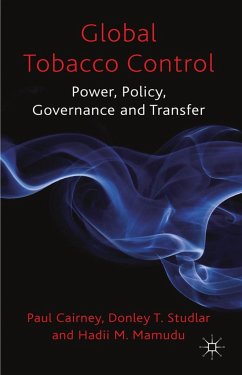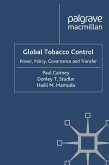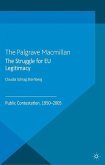The first major book by political scientists explaining global tobacco control policy. It identifies a history of minimal tobacco control then charts the extent to which governments have regulated tobacco in the modern era. It identifies major policy change from the post-war period and uses theories of public policy to help explain the change.
'This readable book uses well-established theories from political and policy science to explain and interpret the tug-of-war between public health and the tobacco industry that has occurred over the past half century. It is not only an important contribution to political science, but provides a framework for practitioners to understand how and why public health has succeeded that can be used to think about and act in the future.'
- Stanton A. Glantz, Professor of Medicine, American Legacy Foundation Distinguished Professor in Tobacco Control and Director, Center for Tobacco Control Research and Education, University of California, USA
'Global Tobacco Control is a masterful and comprehensive study of tobacco control policies across nations. While the health problems associated with tobacco are similar across nations, policy responses have varied in both intensity and timing of adoption, and in effect. By exploring these variations systematically, Cairney, Studlar and Mamudu have written a book that will be closely studied and taught in political science, public policy studies, public health, and associated fields.'
- Bryan D. Jones, J.J. "Jake" Pickle Regent's Chair in Congressional Studies, Department of Government, University of Texas, USA
'If smoking control is an idea whose time has come, then this volume is a book whose time has truly arrived. Smoking is not just a public health issue. The authors successfully unravel the legal and political considerations of the 'tobacco problem' which was spread around the world by the expanding economic reach and social power of tobacco companies. Today, tobacco is not simply the subject of public policy but requires on-going global policy responses. The authors - Cairney, Studlar and Mamudu - each distinguished in their separate fields of international relations, political science and public health, bring practical wisdom and conceptual justification behind the pressing need for tobacco control.'
- Diane Stone, Winthrop Professor, University of Western Australia, Australia
'This is an excellent case study in which the authors provide a thorough account of global tobacco control issues using political and public policy analysis. The book is clearly written, accessible and will be of great interest to students of politics, policy analysis and public health.'
- Rob Baggott, Professor, Health Policy Research Unit, De Montfort University, UK
- Stanton A. Glantz, Professor of Medicine, American Legacy Foundation Distinguished Professor in Tobacco Control and Director, Center for Tobacco Control Research and Education, University of California, USA
'Global Tobacco Control is a masterful and comprehensive study of tobacco control policies across nations. While the health problems associated with tobacco are similar across nations, policy responses have varied in both intensity and timing of adoption, and in effect. By exploring these variations systematically, Cairney, Studlar and Mamudu have written a book that will be closely studied and taught in political science, public policy studies, public health, and associated fields.'
- Bryan D. Jones, J.J. "Jake" Pickle Regent's Chair in Congressional Studies, Department of Government, University of Texas, USA
'If smoking control is an idea whose time has come, then this volume is a book whose time has truly arrived. Smoking is not just a public health issue. The authors successfully unravel the legal and political considerations of the 'tobacco problem' which was spread around the world by the expanding economic reach and social power of tobacco companies. Today, tobacco is not simply the subject of public policy but requires on-going global policy responses. The authors - Cairney, Studlar and Mamudu - each distinguished in their separate fields of international relations, political science and public health, bring practical wisdom and conceptual justification behind the pressing need for tobacco control.'
- Diane Stone, Winthrop Professor, University of Western Australia, Australia
'This is an excellent case study in which the authors provide a thorough account of global tobacco control issues using political and public policy analysis. The book is clearly written, accessible and will be of great interest to students of politics, policy analysis and public health.'
- Rob Baggott, Professor, Health Policy Research Unit, De Montfort University, UK









